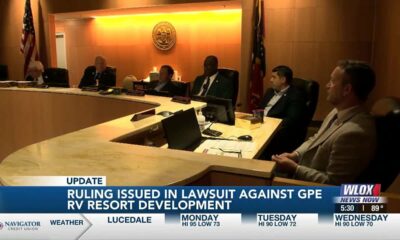Mississippi Today
6,000 U.S. doctors urge the Supreme Court to keep abortions in medical emergencies legal

Originally published by The 19th
Nearly 6,000 doctors, hailing from all 50 states, have drafted a letter asking the Supreme Court to uphold a federal law that requires hospital emergency departments to provide abortions when they are needed to stabilize patients.
The letter, organized by the left-leaning Committee to Protect Health Care and shared first with The 19th, concerns the case Idaho v. United States, which the high court heard in April.
In that case, the federal government has argued that the Emergency Medical Treatment and Labor Act — a 1986 law known as EMTALA — requires that hospitals participating in the federal Medicare program provide abortions if doing so is the necessary treatment in an emergency. Idaho has contested that interpretation, and argued that its state-level abortion ban supersedes federal law. Idaho's current ban allows an exception only if the procedure will save the life of the pregnant person, but not if it will otherwise preserve their health.
“We know firsthand how complications from pregnancy can lead very quickly to a medical crisis, requiring immediate care and treatment,” states the letter, which was signed by doctors across specialties whose abilities to provide care could be affected by a ban, including oncology, emergency medicine and anesthesiology. “These patients' complications can range from a miscarriage to heavy bleeding, from placental abruption to a stroke from severe preeclampsia – and doctors and health professionals in emergency departments must be allowed to use the full range of medical options to save these patients' lives, including abortion.”
The case is one of two abortion-related challenges the court has heard this term, and one of the first since the overturn of Roe v. Wade in the 2022 decision Dobbs v. Jackson Women's Health Organization. A decision is expected this June.
The court has held that, while this case is pending, the federal government cannot enforce EMTALA in Idaho. As a result, patients in the midst of medical emergencies have flown to Utah — the next closest state with abortion access — to receive treatment.
Abortions that would be covered by EMTALA constitute only a tiny fraction of terminations performed in the United States. Still, the case has sparked tremendous concern among physicians.
“If someone is having a crisis and part of the treatment involves an abortion — or any procedure or intervention that might be deemed an abortion by a prosecutor down the road — that is something we shouldn't have to think about,” said Dr. Rob Davidson, a Michigan-based emergency physician and the committee's executive director. “When I have a pregnant woman having a crisis, my first call should be to an OB, and not a lawyer.”
It's not clear how the Supreme Court will rule, but their decision could have implications well beyond abortion. Already, the fear of violating strict abortion bans has deterred aspiring and practicing physicians from setting up shop in states with such laws — particularly in Idaho, which has seen an exodus of maternal-fetal medicine specialists in the almost two years since Roe's fall. Physicians in the state worry a court finding in favor of Idaho might exacerbate that trend.
Legal scholars say that if the court finds EMTALA does not protect abortion as one form of emergency medical care, states could subsequently restrict other treatments — undercutting the law's core holding that patients who present at emergency rooms are guaranteed to at least receive stabilizing treatment.
“The basis of Dobbs is states have the power to regulate medical care. If you extend that to EMTALA, you open up EMTALA to whatever drama a state wants to play out in its emergency rooms,” Sara Rosenbaum, a professor emerita of health law and policy at George Washington University who has written extensively about EMTALA, told The 19th last month.
This could theoretically include prohibiting hospitals from providing emergency care for patients with HIV or substance use disorder — treatment they would ordinarily be required to provide.
“What if someone says, ‘We don't believe in harm reduction programs for opioid use disorder, so we don't think we should provide naloxone kits when patients leave the ER?'” Davidson asks. “This is bad enough that I don't have to imagine what could happen next, or what else they could carve out. But you're opening a Pandora's box.”
This article first appeared on Mississippi Today and is republished here under a Creative Commons license.
Mississippi Today
Dau Mabil’s widow, her family say they seek justice for him
Karissa Bowley and her family say they support all efforts to find justice for the late Dau Mabil, one of the “Lost Boys” of Sudan who came to Jackson in 2000 despite implications by others to the contrary.
“Dau was special before he ever married me,” his widow told reporters in a Friday press conference. “I'm just here, missing him.”
Mabil, a 33-year-old Belhaven Heights resident, disappeared March 25. He was seen on video surveillance on Jefferson Street between Fortification and High streets, and at one point went to the Museum Trail to check on corn he planted.

Bowley searched for her husband with others. “The whole ordeal has been frustrating and tragic,” she said. “I wouldn't wish it on anybody.”
Three weeks after his disappearance, a fisherman spotted a body floating in the Pearl River near Lawrence County, more than 50 miles away. By April 18, a preliminary autopsy had revealed the body belonged to Mabil. The Lawrence County sheriff said there was no evidence of foul play. Her family said Friday that authorities told them they are waiting on toxicology tests before finalizing the official autopsy.
Bowley said it wasn't unusual for Dau to leave without his phone and his identification.
Texts contained in court records reveal a strained relationship between Bowley and Mabil. Bowley complained that Mabil was “drinking a lot,” and Mabil complained that Bowley “does not know how to control her emotions.”
Bowley's brother, Spencer, responded Friday, “No marriage is perfect, and theirs wasn't either.”
But he said the allegation that Bowley or the family had anything to do with Mabil's disappearance is simply false.
He said some claimed on social media that Bowley contacted police just 30 minutes after Mabil disappeared or that she waited until the next day. He said both claims are entirely false.
Bowley said there is a void where her husband once was. “Grief is your body, mind and spirit saying no,” she said, “but the reality is still there.”
After the state finishes its investigation, official autopsy results will be released to Bowley and Mabil's brother, Bul, according to a court order.
Bul Mabil recently won the right to have an independent autopsy performed on Dau's remains.
Bowley's family said they support all efforts by Bul Mabil and others to find justice.
“I'm feeling very deeply the loss of Dau. I keep pushing for justice for Dau,” Bowley said. “He's a person I care to honor the rest of my life.”
This article first appeared on Mississippi Today and is republished here under a Creative Commons license.
Mississippi Today
Gwen Dilworth joins health team at Mississippi Today

Mississippi Today is pleased to announce that Gwen Dilworth has joined the community health team at Mississippi Today.
Dilworth is a native of Durham, North Carolina, and most recently completed a fellowship at The Times-Independent in Moab, Utah, where she covered local government and Southeast Utah's mining industry. Before that, she worked at Innocence Project New Orleans where she advocated for people serving long sentences for nonviolent crimes.
“Gwen is not only a fantastic writer but an impressive investigator with a diverse skill set and a knack for ensuring accuracy,” said Kate Royals, community health editor at Mississippi Today. “Mississippi is lucky to have her here.”
Dilworth also served as a fact checker for Boyce Upholt's book “The Great River: The Making and Unmaking of the Mississippi” and freelanced for local news publication The Mid-City Messenger in New Orleans.
“It is a privilege to have the opportunity to cover a beat that is so important and connected to Mississippians' daily lives,” said Dilworth. “I'm thrilled to be joining a team of passionate and talented journalists covering critical topics in the state with thoughtfulness and care. I'm looking forward to learning from and being a part of such a vibrant and welcoming community.”
Dilworth will report on the intersection of health and criminal justice, among other areas of the health beat.
This article first appeared on Mississippi Today and is republished here under a Creative Commons license.
Mississippi Today
On this day in 1965
JUNE 14, 1965

The Mississippi Freedom Democratic Party organized a one-mile silent march, starting at Morning Star Baptist Church and ending at the Mississippi Capitol, where lawmakers were contemplating changes in voting laws.
Jackson police arrested the marchers, more than half of them students from Lanier High School. Over the next few weeks, more than 1,000 were arrested and held in livestock pens at the Mississippi State Fairgrounds.
During the protest, 5-year-old Anthony Quin waved a U.S. flag outside the Governor's Mansion. Matt Herron's photograph of state trooper Huey Krohn trying to wrestle the flag from Quin's hands ran in The New York Times and other newspapers across the U.S. Quin later said that his mother had told him to hold onto that flag for dear life — and he did.
On June 30, a three-judge panel of the 5th U.S. Circuit Court of Appeals ordered the release of those arrested and barred the city of Jackson from making any further arrests.
Despite Quin's young age, this wasn't his first brush with the civil rights movement. A month before this photo was taken, his family's home was firebombed in McComb because of their work in the movement. He and his sisters went on to become the first students to integrate McComb public schools.
From those days of fighting racism on a day-by-day basis, Quin learned to care for students. He became a principal of several different elementary schools before becoming an administrator over the schools. In 2015, he died of pancreatic cancer.
This article first appeared on Mississippi Today and is republished here under a Creative Commons license.
-
Mississippi Today4 days ago
Key Mississippi leader is open to replacing state’s white supremacist statues in Washington
-
SuperTalk FM5 days ago
Mississippi doctor helps save teen girl’s life after shark attack
-
Mississippi News7 days ago
PCSO makes arrest for multiple charges
-
Our Mississippi Home6 days ago
Open Mic Poetry Night Features Mississippi Artist, Laura Mayo
-
Mississippi Today7 days ago
On this day in 1963
-
Local News Video5 days ago
Judge affirms legality of Gulf Park Estates RV Resort special exception
-
Mississippi News4 days ago
Boil water notice issued for some Noxubee County residents
-
228Sports6 days ago
Southern Six High Schools Change Coaches In Baseball, Football, Basketball








































